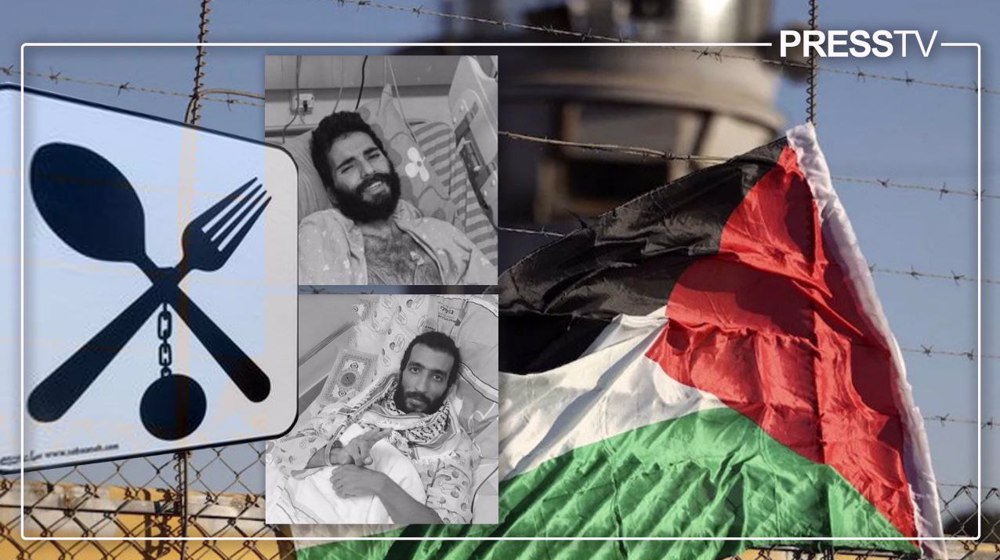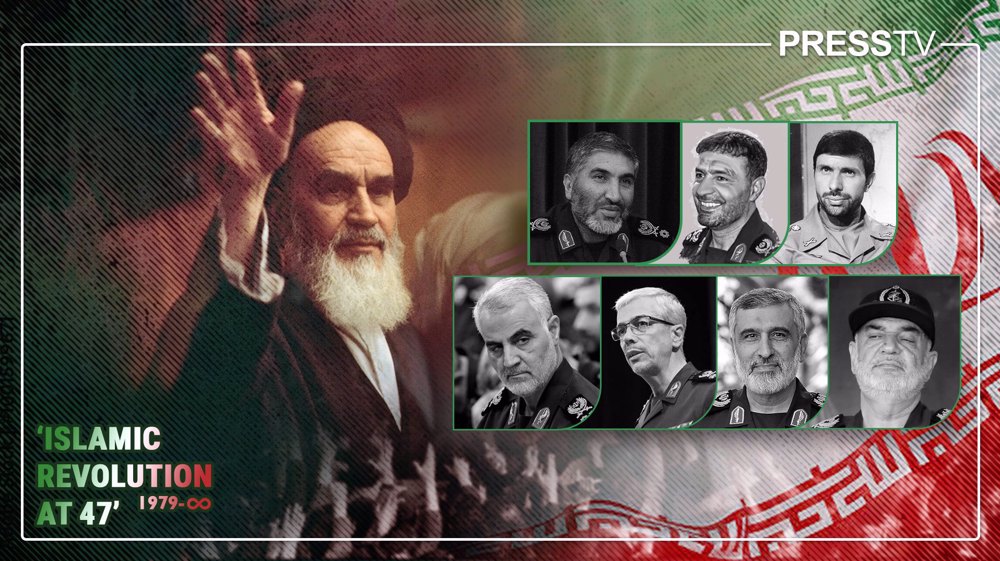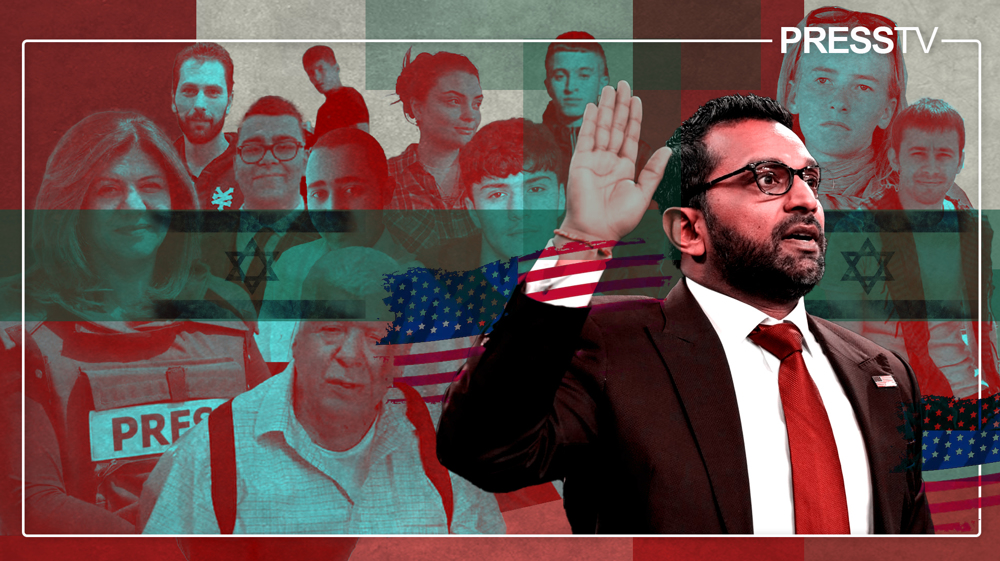Palestinian prisoners suffer in Israeli jails but refuse to bow to occupation
By Hiba Morad
The hunger strike launched by Palestinian prisoners on Thursday has been suspended following negotiations with the Israeli prison authorities, an expert on Palestinian affairs confirmed to the Press TV website.
He, however, cautioned that the strike will resume if the regime fails to alleviate the concerns of prisoners.
In a conversation with the Press TV website late on Saturday, Imad Dalloul said an uneasy calm prevails as prisoners, Palestinian people and human rights bodies wait to see the outcome of negotiations.
The campaign to free the persecuted Palestinian prisoners -- a prelude to the liberation of occupied Palestinian territories -- has grown louder, a Palestinian prisoner solidarity network told the Press TV website.
According to Samidoun Network, 1000 prisoners were on hunger strike over escalating attacks on prisoners, most recently when regime forces ambushed the Naqab desert prison and transferred 75 prisoners.
There were also nine prisoners on hunger strike against so-called "administrative detention," imprisonment without charge or trial.
“There are now over 1200 Palestinians held under administrative detention (out of 5000 total Palestinian prisoners), the highest number in 20 years,” Samidoun Network told the Press TV website.
“We are working around the world to build solidarity with the Palestinian prisoners, the Palestinian people and their resistance to meaningfully pressure all of the complicit Western governments to break their ties with the Zionist regime to free the prisoners and free Palestine," it added.
Voices of resistance
According to the Palestinian rights body, the reason why prisoners are facing relentless attacks is because they represent “the Palestinian resistance and a united Palestinian front” that is committed to liberation.
“Notorious fascist (Israeli) minister Itamar Ben Gvir is vowing to step up repression against prisoners, and they are fighting back,” Samidoun told the Press TV website.
Since he joined the Israeli far-right cabinet, Ben-Gvir has upped the regime's repressive actions against Palestinians, especially prisoners.
In July, he announced an amendment to the law on the administrative release of Palestinian prisoners, canceling a previous policy that had allowed the early release of some Palestinian prisoners from prisons.
According to Palestinian media, measures imposed on prisoners since Ben-Gvir assumed office include controlling the amount of water that they can consume, reducing the duration of showering so that prisoners are allowed to shower at a specific hour, and locking bathrooms designated for showering in some prisons.
Other measures include providing prisoners with bad bread, as well as doubling the raids and searches against them using stun grenades and sniffer dogs.
He also approved a preliminary reading of a draft law depriving prisoners of medical treatment and surgical operations, and the approval of the Ministerial Legislative Committee in the Israeli regime of a draft law approving capital punishment for prisoners involved in the armed resistance.
A living example
Speaking to the Press TV website, the father of Palestinian prisoner Tamim Salem said hundreds of Palestinian prisoners suffer collective punishment and live in miserable conditions inside Israeli jails.
In October 2021, Palestinian human rights bodies urged the International Committee of Red Cross (ICRC) to pressure the regime to halt the collective punishment of Palestinian prisoners held in Israeli prisons.
The organization said 19 prisoners were isolated, stripped of their personal belongings in cells unfit for human use in degrading conditions amid what the prisoners described as “collective punishment that amounts to torture.”
Among these prisoners was Salem, who was quoted as saying by NGOs that they remained handcuffed and chained even when leaving their cells for a “one-hour break.”
“Since the beginning of his arrest, Tamim has been subject to different forms of torture, isolation and punishment,” his father No’man told the Press TV website.
“Palestinian prisoners suffer collective punishment and live in degrading conditions that are not appropriate for human beings even in terms of drinking water, food, bathroom, etc.”
Salem’s father said his son has ever since been on hunger strikes in solidarity with his fellow prisoners.
“Tamim is always missed in our family on all occasions, we always long to see him and have him around. Everything reminds us of him," he said.
"There are certain foods that we have not eaten for years since he got prisoned by the Israeli regime because it is his favorite and it feels bad to enjoy it without him."
The prisoner’s father said he and other family members contacted the ICRC and other organizations to facilitate a meeting with Salem and to demand his release, but they were met with “deaf ears”.
They are allowed to contact Salem only once a month or every other month, with only four members every time and through public phones.
“This is the case with hundreds of Palestinian prisoners in Israeli prisons, my son Tamim is not the only one."
Isolation and other harsh conditions
It is difficult to be in touch with prisoners directly because the occupation works very hard to prevent them from having contact with the outside world, according to the Samidoun Network.
“They want to keep them isolated,” the solidarity movement told the Press TV website, adding that it is important for their families and lawyers to keep in touch with prisoners lodged in Israeli jails.
"There is an ongoing attack against prisoners in general and against leaders in the prisoners' movement like Nael Barghouthi, Wael Jaghoub and others who have been transferred, isolated and sent to interrogation."
According to the Palestinian prisoners network, the arbitrary practice of administrative detention is sharply escalating and repressive units are invading the prison cells regularly.
“What this means is that there are conditions in the prisons that are close to an explosion, and this is why we are seeing the escalating steps of resistance and protest and real unity among the prisoners' movement to rise and confront these attacks,” Samidoun told Press TV website.
Former Palestinian prisoner and activist Annan Najib also told the Press TV website that many of his friends continue to languish and suffer behind bars.
“The conditions in which Palestinian prisoners live are devastating and there are no serious moves to demand their rights and freedom,” he said.
According to Najib, his bitter experience in Israeli jails allows him to relate to prisoners who are currently suffering under dire conditions.
“Israelis however should keep in mind that the people of Palestine will not give up, and that Palestinian prisoners will keep resisting, will start hunger strikes and stand in solidarity together," Najib said.
"At the end of the day, it is a tough journey but they will win this battle."
Indian author pulls out of Berlinale over jury’s ‘unconscionable’ refusal to comment on Gaza
Bangladesh Nationalist Party secures victory in general election
VIDEO | British High Court rules against ban on Palestine Action Group
Tehran urges ‘serious’ revision in EU ‘unconstructive’ approaches
Hamas slams Israeli settlers’ ‘criminal aggression’ in West Bank
VIDEO | Press TV's news headlines
VIDEO | Iran launches 'Holy Qur'an Does Not Burn' campaign to restore mosques damaged in unrest
VIDEO | Ramadan amid the rubble: Gaza’s historic Al-Zawiya market defies odds










 This makes it easy to access the Press TV website
This makes it easy to access the Press TV website